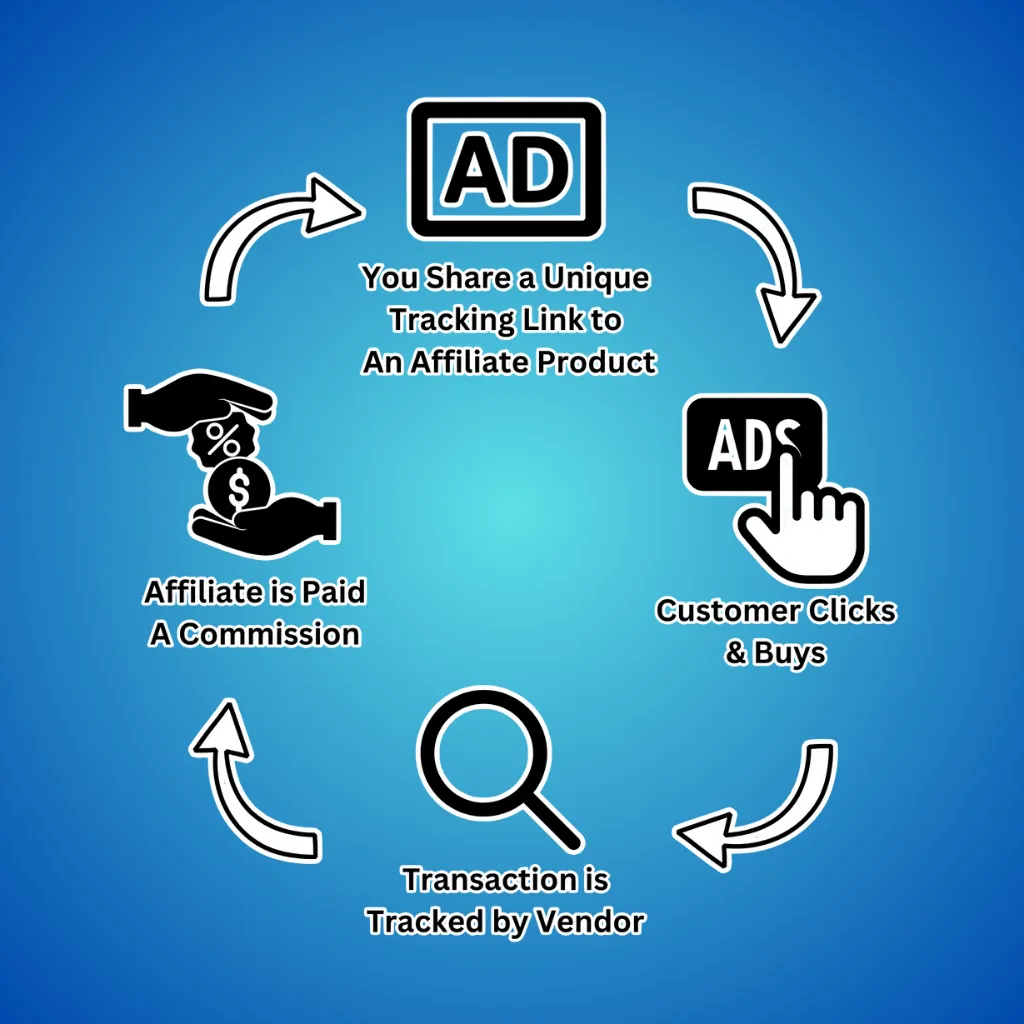

Affiliate marketing is a method of earning money online by promoting other people’s products or services. When you become an affiliate marketer, you share links to these products on your website, blog, social media, or other platforms. If someone clicks on your link and makes a purchase, you earn a commission. It’s a simple yet powerful way to monetize your online presence without having to create your own products.
Imagine you have a blog about fitness. You join an affiliate program for a company that sells fitness equipment. You write a blog post reviewing a new set of dumbbells, including your unique affiliate link. When your readers click on the link and buy the dumbbells, you earn a percentage of the sale.
This is the most common type of affiliate marketing. You earn a commission each time a sale is made through your referral link. For example, if you promote a book and a visitor buys it using your link, you get a percentage of the sale price.
In this model, you earn money based on the number of visitors you send to the merchant’s website, regardless of whether they make a purchase. For instance, you share a link to an online clothing store, and you get paid for each click.
Here, you earn commissions when you generate leads for the merchant. This could involve visitors signing up for a newsletter, filling out a contact form, or downloading a free trial. For example, you promote a software service, and you get paid for each new trial signup through your link.
Content Sites Content sites focus on providing valuable information, tutorials, and articles related to a particular niche. They incorporate affiliate links naturally within their content. For example, a cooking blog might include affiliate links to recommended kitchen gadgets within its recipe posts.
Review Sites Review sites specialize in evaluating and comparing products. They often provide detailed reviews and ratings, helping consumers make informed decisions. These sites generate affiliate revenue by linking to the products they review. For example, a tech review site might compare different smartphones and include affiliate links to purchase each model.
Influencer-driven affiliate marketing leverages the reach and trust that influencers have with their audience. Influencers promote products or services through their social media channels, blogs, or YouTube channels. They earn commissions on sales generated through their unique affiliate links. For instance, a fitness influencer might promote workout supplements and earn a commission on each sale made through their link.
Email list affiliates use their email subscriber base to promote affiliate products. They send newsletters or promotional emails containing affiliate links. This method relies on building a strong relationship with subscribers and providing valuable content. For example, a financial advisor might send weekly newsletters with affiliate links to recommended financial tools and services.
Webinars and video-based affiliates create video content or host live webinars to promote affiliate products. They provide in-depth demonstrations, tutorials, or discussions about the products, often including affiliate links in the video description or during the webinar. For instance, a software expert might host a webinar showcasing the features of a new productivity tool, encouraging viewers to sign up using their affiliate link.
Affiliate marketing encompasses a variety of models beyond the common types like pay-per-sale, pay-per-click, and pay-per-lead. Content sites and review sites offer value through in-depth articles and product comparisons, while influencer-driven marketing leverages the trust and reach of social media influencers. Email list affiliates utilize their subscriber base for promotions, and webinars or video-based affiliates provide detailed product demonstrations.
Additional types include coupon and deal sites, which attract users with discounts, and loyalty and cashback programs, which incentivize repeat purchases. Comparison shopping sites help users find the best deals, and niche community sites target specific interests. PPC affiliate marketing involves paid advertising campaigns, and content syndication broadens the reach of affiliate content across multiple platforms. Mobile app affiliates focus on promoting apps, while sub-affiliate networks create multi-tiered earning opportunities. Influencer networks connect brands with social media influencers for targeted campaigns.
These examples only scratch the surface of the diverse world of affiliate marketing, as there are many more types beyond the scope of this article or too numerous to mention here.
Affiliate networks act as intermediaries between affiliates and merchants. They offer a wide range of products from various companies, making it easy to find products to promote. Popular affiliate networks include:

Many companies offer their own affiliate programs. To find these, you can visit a company’s website and look for a link to their affiliate program, usually found in the footer or under “Partnerships” or “Affiliates.”
You can use Google to find affiliate programs by searching for “[your niche] + affiliate program.” For example, searching for “fitness affiliate program” will provide a list of companies offering affiliate opportunities in the fitness niche.
Description for this block. Use this space for describing your block. Any text will do. Description for this block. You can use this space for describing your block.
Affiliate marketing is a performance-based marketing strategy where businesses reward affiliates (partners) for driving traffic or sales to their products or services through the affiliate’s marketing efforts.
Affiliates promote a business’s products using unique affiliate links. When a user clicks on the link and makes a purchase, the affiliate earns a commission.
What Are the Key Components of Affiliate Marketing?
Merchant: The business offering the product.
Affiliate: The promoter of the product.
Customer: The end user who buys the product.
Affiliate Network: Sometimes acts as an intermediary between merchants and affiliates.
Low start-up costs for affiliates.
Merchants gain access to a broader audience.
Performance-based earnings, reducing risks for merchants.
Choose a niche that interests you.
Research and join affiliate programs.
Create quality content and promote your affiliate links.
Track your performance and optimize your campaigns.
Pay-Per-Click (PPC): Affiliates earn a commission for each click.
Pay-Per-Lead (PPL): Affiliates earn for leads generated.
Pay-Per-Sale (PPS): Affiliates earn a percentage of each sale made through their link.
Focus on creating valuable content.
Build a trustworthy online presence.
Utilize SEO and social media to drive traffic.
Continuously analyze and improve your strategies.
High competition in popular niches.
Risk of fraudulent activities.
Keeping up with industry changes and trends.